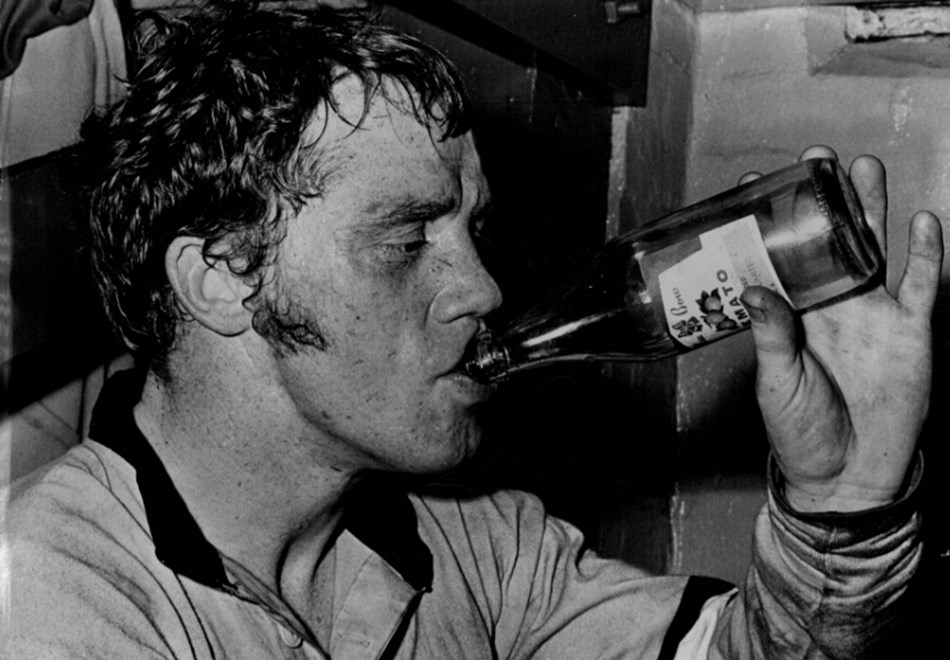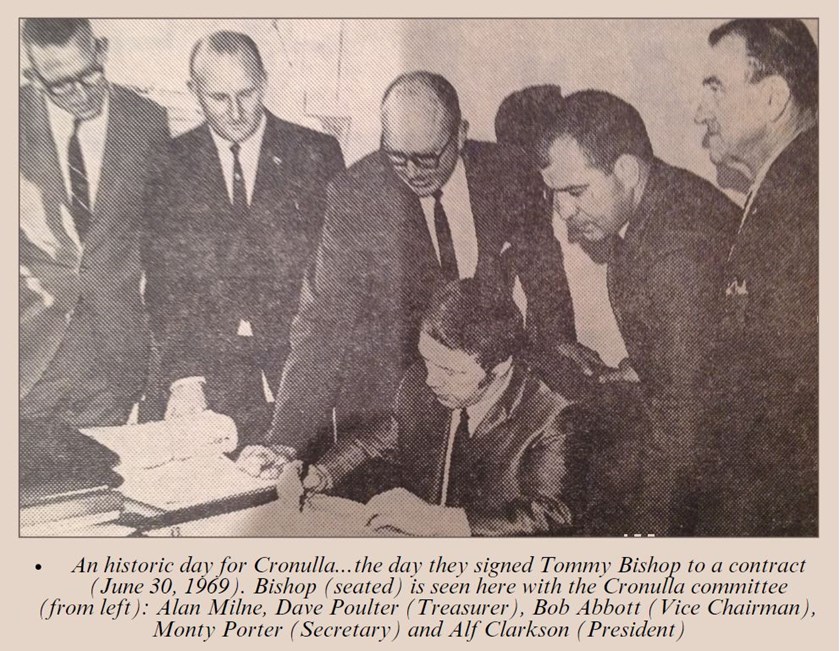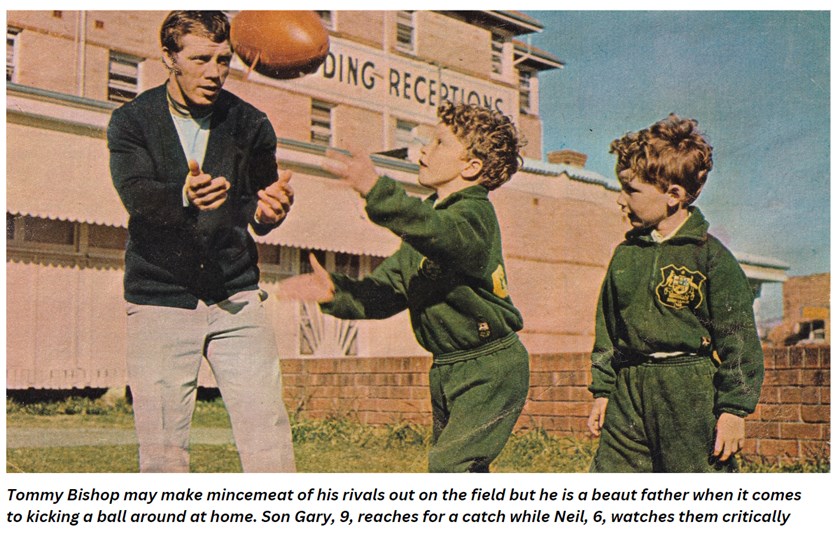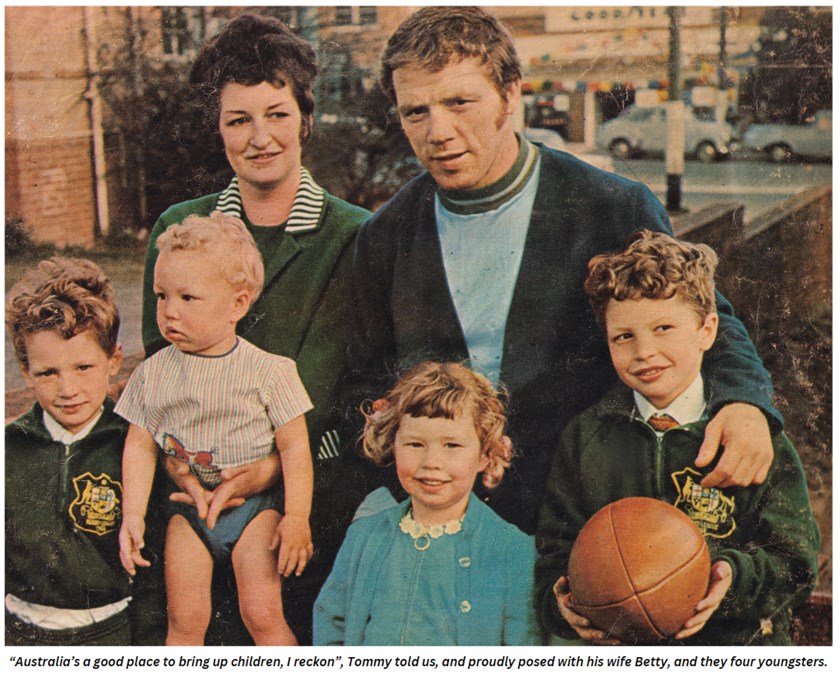

The annals of history are littered with incredible sporting stories of triumph against adversity – those come-from-behind victories where defeat seemed the more likely outcome.
In modern times, these unexpected wins are often referred to as "doing a Steven Bradbury", a nod to the Australian Olympian who won gold by literally being the last one standing after all his speed-skating competitors had fallen over.
During this week on June 30 1969, the Cronulla Sharks had their own 'Bradbury' moment with the signing of the English test halfback, Shark number 50, Tommy Bishop.
In the quiet English town of St Helens, Bishop packed in his potato wholesale business and set sail for Australia with wife Betty and four young children. On the other side of the world, renowned rugby league writer Ernie Christensen had negotiated for Bishop to sign with Sydney glamour club the Eastern Suburbs Roosters. Bishop was set to wear the red, white and blue in 1970 and play alongside stars such as Bill Mullins, Mark Harris, John 'Bomber' Peard and Kevin Junee.
Touching down in Sydney some thirty hours later, Bishop quickly learnt the Roosters had backflipped on the deal and no longer wanted the crafty English number seven. Furthermore, the Parramatta Eels, the next in line for Bishop, had also gone cold on the playmaker. One of the biggest stars of the game and his family were now 17013km from home and without a club.
A third prospect, Easts Newcastle, emerged as a possible option for Bishop, however he wanted desperately to play in the Sydney competition.
And here lies the Sharks' 'Bradbury' moment. With all other options falling over, the only place left for Bishop was Cronulla, the team sitting at the foot of the ladder, the least likely of suitors.
Bishop and his family were driven to The Kingsway Inn, a hotel in Cronulla, to rest their weary heads. En route, Christensen had arranged for Frank Hyde to interview Bishop, at the same time organising solicitor Jim Coman to handle the contract negotiations.

Within 24 hours of his arrival, the deal was done, one day before the deadline set down by rugby league rules to allow a player to play that season. Cronulla paid St Helens the $11,000 transfer fee, securing the most important signing in their short history, and their first genuine superstar.
Bishop was paid $6000 per season and standard match fees from 1970 to 1973. There were still eight matches remaining in 1969 for which Bishop was paid $300 per match.
Bishop later said: "I was supposed to go to Eastern Suburbs. I got to the airport with my wife and kids and the journalist Ernie Christensen, who had arranged things, told me that Easts had dropped out. When he said Cronulla were interested, I nearly got on a plane back home because they were bottom of the competition. But I went to the hotel in Cronulla and settled in, and it turned out to be the best move I could have made."

Cronulla applied to have Bishop's club debut against the Eastern Suburbs Roosters played at the SCG, however the application was denied by league officials, the match instead played at the Sydney Sports Ground. A crowd of 14,583 turned out for the match, the largest crowd ever to have watched the Sharks play. Despite losing 21-16, Bishop showed several moments of pure class.
First in the form of a short pass from a scrum to send lock forward Graeme Sams into a yawning gap and then two spectacular cut out passes to flying winger Ray Corcoran that journalists later reported were too good for Corcoran, who wasn't used to such slick service, resulting in him spilling the ball on both occasions.
"Bishop's type of football was too smart for his teammates on occasions and twice he cut out players to send long passes out to winger Ray Corcoran totally unprepared," Christensen wrote at the time.

Bishop was the catalyst for a number of other English imports that would join the Cronulla Sharks in the following years in Bob Wear, Fred Tomlinson and revered test prop Cliff Watson, who along with Bishop led the side to the club's first grand final appearance in 1973.
Despite only going on to play 60 first-grade games for the Sharks, Bishop's influence was long lasting. In 2005 his contribution was recognised when he was named an Immortal of the Cronulla-Sutherland Sharks and in 2017 he was named halfback in the club's Team of the Half Century.
FACT FILE - TOMMY BISHOP
Born: 15 October 1940 in Lancashire England
Position: Halfback
Playing weight: 74.5kg
Years at club: 1969-73
Player no: 50
Games for club: 60 in first grade
Debut: Round 15, Sunday 6 July 1969 against Easts at Sydney Sports Ground
Last game: Grand final, Saturday 15 September 1973 against Manly at the Sydney Cricket Ground
Statistics for Cronulla: 66 points from 21 tries and two field goals
Representative football: 15 tests for Great Britain from 1966-69, scoring one try and kicking three field goals for nine points
Coaching career: Cronulla (1970-73, 1980) - 114 games, 55 wins, 57 losses, two draws; North Sydney (1979) - 22 matches, two wins and 20 losses; Workington Town (1980-81) - 21 games, nine wins, 11 losses, one draw; Leigh )1983-84) - 37 matches, 18 wins, 19 losses; Barrow (1985) - 11 matches, three wins, seven losses, one draw




